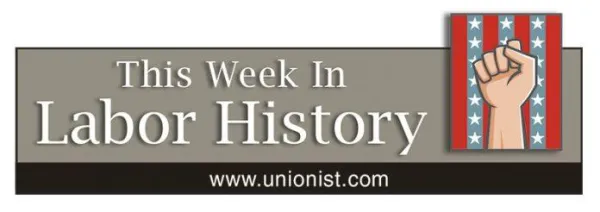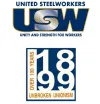This week in labor history: October 24-30

OCTOBER 24
1940 – The 40-hour work week goes into effect under the Fair Labor Standards Act, signed by President Roosevelt two years earlier.
1945 – U.S. minimum wage increases to 40¢ an hour.
OCTOBER 25
1899 – What many believe to be the first formal training on first aid in American history took place at the Windsor Hotel in Jermyn, Penn., when Dr. Matthew J. Shields instructed 25 coal miners on ways to help their fellow miners. Upon completion of the course, each of the miners was prepared and able to render first aid. The training led to marked decreases in serious mining injuries and fatalities.
1934 – Some 25,000 silk dye workers strike in Paterson, N.J.
1949 – In what becomes known as the Great Hawaiian Dock Strike, a six-month struggle to win wage parity with mainland dock workers ends in victory.
1990 – The Tribune Co. begins a brutal five-month-long lockout at the New York Daily News, part of an effort to bust the newspaper’s unions.
1995 – John Sweeney, president of the Service Employees Int’l Union, elected president of AFL-CIO.
2011 – After a two-year fight, workers at the Bonus Car Wash in Santa Monica, Calif., win a union contract calling for pay increases, better breaks and other gains. “They didn’t treat us like people,” nine-year employee Oliverio Gomez told the Los Angeles Times.
OCTOBER 26
1825 – After eight years and at least 1,000 worker deaths — mostly Irish immigrants — the 350-mile Erie Canal opens, linking the Great Lakes and the Atlantic Ocean. Father John Raho wrote to his bishop “so many die that there is hardly any time to give Extreme Unction (last rites) to everybody. We run night and day to assist the sick.”
OCTOBER 27
1904 – The New York City subway, the first rapid-transit system in America, opens. More than 100 workers died during the construction of the first 13 miles of tunnels and track.
1935 – Three strikes on work-relief projects in Maryland were underway, with charges that Depression-era Works Projects Administration jobs were paying only about 28 cents an hour — far less than was possible on direct relief. Civic officials in Cumberland, where authorities had established a 50-cent-per-hour minimum wage, supported the strikers.
1951 – The National Labor Council is formed in Cincinnati to unite Black workers in the struggle for full economic, political and social equality. The group was to function for five years before disbanding, having forced many AFL and CIO unions to adopt non-discrimination policies.
OCTOBER 28
1879 – Union organizer and anarchist Luisa Capetillo is born in Arecibo, Puerto Rico. She organized tobacco and other agricultural workers in Puerto Rico and later in New York and Florida. In 1916 she led a successful sugar cane strike of more than 40,000 workers on the island. She demanded that her union endorse voting rights for women. In 1919, three years before her death, she was arrested for wearing pants in public, the first woman in Puerto Rico to do so. The charges were dropped.
1965 – The St. Louis Gateway Arch is completed after two and one-half years. Originally sold as a jobs program for thousands of African Americans in St. Louis suffering from the Depression, the 630-foot high arch of stainless steel marks the Jefferson National Expansion Memorial on the waterfront of St. Louis, Mo. Although it was predicted 13 lives would be lost in construction, not a single worker died.
OCTOBER 29
1889 – Japanese immigrant and Labor advocate Katsu Goto is strangled to death, his body then strung from an electric pole, on the Big Island of Hawaii by thugs hired by plantation owners. They were outraged over Goto’s work on behalf of agricultural workers and because he opened a general store that competed with the owners’ own company store.
1929 – “Black Tuesday” — Wall Street crashes, throwing the world’s economy into a years-long crisis including an unemployment rate in the U.S. that by 1933 hit nearly 25 percent.
OCTOBER 30
1986 – Ed Meese, attorney general in the Ronald Reagan administration, urges employers to begin spying on workers “in locker rooms, parking lots, shipping and mail room areas and even the nearby taverns” to try to catch them using drugs.
1991 – The fishing boat Andrea Gail, out of Gloucester, Mass., is caught in a ferocious storm and lost at sea with her crew of six. The event inspired the book, “The Perfect Storm,” by Sebastian Junger, and a film by the same name. The city of Gloucester has lost more than 10,000 whalers and fishermen to the sea over its 350-year history.
(Compiled by David Prosten, founder of Union Communication Services)
